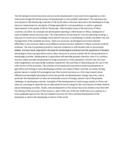| dc.contributor.author | Odingo, RS | |
| dc.date.accessioned | 2015-07-31T13:28:51Z | |
| dc.date.available | 2015-07-31T13:28:51Z | |
| dc.date.issued | 1981 | |
| dc.identifier.citation | GeoJournal 1981, Volume 5, Issue 6, pp 521-530 | en_US |
| dc.identifier.uri | http://link.springer.com/article/10.1007/BF00213562 | |
| dc.identifier.uri | http://hdl.handle.net/11295/89409 | |
| dc.description.abstract | The link between natural resources and economic development is more and more regarded as a fact today even though the whole process of development is only partially understood. The awareness has now spread to the developing countries of the world where resources have yet to be developed to bring about an improvement in standards of living especially for rural populations, as well as a general improvement in the quality of life for the people. Unfortunately many of the resources of these countries are still to be surveyed and development planning is often based on flimsy, inadequate or even unreliable natural resource data. The improvement of data base for resource planning would go a long way to ensure more knowledge about natural resources in developing countries and better use and management of the available resources. There are economic, technological and environmental difficulties to be overcome before more efficient natural resource utilization in these countries could be achieved. The role of population growth in resource realization is still clouded with an inconclusive debate. But even more important is the need for technological assistance and the application of modern technology to food and agriculture and to other resources to ensure a better life for the populations of developing countries. Developments in agriculture will need the greatest attention since it is a primary resource which provides employment for large proportions of the population, food for the rural and urban populations and exportable surpluses required for the purchase of industrial goods for use in the other sectors of the economy. The activities of transnational corporations distort developments in agriculture and mining in many developing countries and many of these countries are today making greater moves to realize full sovereignty over their natural resources as a first step towards more efficient and meaningful planning for economic growth and development. Energy resources, and in particular the development of new and renewable sources of energy, present one of the greatest challenges to developing countries. Examples of the development of rural energy systems in China and India are promising to open the way to alternative forms of energy for the rural masses of other similarly placed developing countries. Finally, new developments in the natural resources debate concerned with the sharing of the resources of the oceans as seen in the Law of the Sea Conference are a pointer to a more equitable approach to the use of global resources for the continued development of the developed as well as the developing countries of the world. | en_US |
| dc.language.iso | en | en_US |
| dc.publisher | University of Nairobi | en_US |
| dc.title | New perspectives on natural resource development in developing countries | en_US |
| dc.type | Article | en_US |
| dc.type.material | en | en_US |

